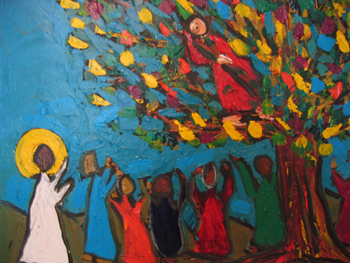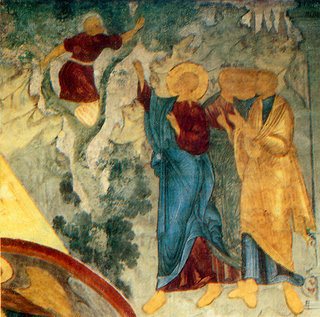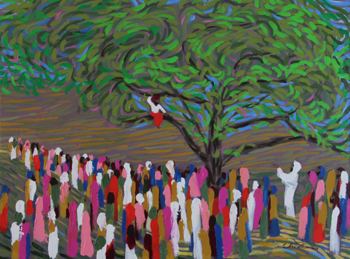For Sunday November 3, 2019
Lectionary Readings (Revised Common Lectionary, Year C)
Habakkuk 1:1-4, 2:1-4
Psalm 119: 137-144
2 Thessalonians 1:1-4, 11-12
Luke 19:1-10
In his collection of essays, The Weight of Glory, C.S Lewis challenges his readers to see themselves and their neighbors as Jesus sees them. To apprehend the extraordinary and the immortal in all people:
“It is a serious thing to live in a society of possible gods and goddesses, to remember that the dullest and most uninteresting person you talk to may one day be a creature which, if you saw it now, you would be strongly tempted to worship, or else a horror and a corruption such as you now meet, if at all, only in a nightmare. All day long we are, in some degree, helping each other to one or other of these destinations. It is in the light of these overwhelming possibilities, it is with the awe and the circumspection proper to them, that we should conduct all our dealings with one another, all friendships, all loves, all play, all politics. There are no ordinary people. You have never talked to a mere mortal."
These are, needless to say, bold and compelling words. How different my life would look if I took up Lewis’s challenge. How high the stakes would become in the interactions I have with those around me. How full of surprise and possibility each day would be.
In our Gospel story this week, Jesus models the luminous kind of vision Lewis describes in his book. Jesus sees in a way that ushers in salvation. Standing under a sycamore tree, he gazes up at a tax collector named Zaccheus with such loving, penetrating intensity that the gaze transforms not only the man in the tree, but everyone around him. Jesus enables both Zaccheus and the crowd of disapproving onlookers to become the immortal wonders God created them to be.
The story is a simple one. I’m guessing most of us learned it as children: Once there was a man who wanted desperately to see Jesus, but a crowd was in his way. The man's desperation drove him ahead of the crowd and up into the branches of a sycamore tree, where he hoped to catch a glimpse of Jesus. When Jesus passed under the tree, he looked up and said, "Hurry down, Zacchaeus, for I must stay at your house today. The man scrambled out of the tree, filled with delight to take Jesus home with him. But the crowd was indignant and grumbled, “What business does Jesus have getting cozy with a sinner?” But the man stood his ground, saying, "Master, I give away half my income to the poor — and if I’m caught cheating, I pay four times the damages.” Then Jesus said, “Today salvation has come to this house, because this man, too, is a son of Abraham. For I have come to seek and to save the lost.”
 |
I don't know about you, but I'm shaken by the questions this simple Gospel story raises. Having grown up in the Church, steeped in Scripture and surrounded by the trappings of Christianity, I tend to assume that I can see myself, Jesus, and other people fairly clearly. But Zacchaeus's story gives me pause, because it's all about accepting the smallness of my vision. It’s about the courage it takes to recognize that God sees so much more than I do. It’s about becoming vulnerable before the very people I have hurt as a result of my impoverished perspective, so that our mutual transformation can do its painful, joy-making work. There's nothing childish about this story at all, except perhaps my tendency to run away from its challenging implications.
Maybe the best way to re-see this story is to take it line by line, and consider the questions it asks of us:
“Once there was a man who wanted desperately to see Jesus, but a crowd was in his way.” Already, I am implicated. Already, I have to ask myself: When was the last time my desire for Jesus felt desperate? When did I last long for “more?” More meaning, more depth, more authenticity, more life? How long has it been since I last paid careful attention to "the crowd?” To the obstacles, the distractions, the old assumptions and failures that block my clear vision of the Divine? Too often, I ignore my urgent need for Jesus until the urgency itself dulls and recedes, and the “crowd” of hindrances wins. To follow Zaccheus’s example is to follow my yearning — to see that my yearning echoes God’s yearning for me.
“The man's desperation drove him ahead of the crowd and up into the branches of a sycamore tree, where he hoped to catch a glimpse of Jesus.” Zaccheus recognizes that he needs to shift, to move, to relocate. Have I noticed recently that my spiritual vision is limited? Have I recognized that I need a new angle, a new perspective, a new starting place? What’s remarkable about Zaccheus is that he risks looking like an idiot in order to see further and more clearly. When is the last time I did something risky, or unconventional, or undignified for the sake of my faith? Have I ever waited in an unfamiliar place for however long it takes, trusting that Jesus will come my way eventually?
“When Jesus passed under the tree, he looked up and said, ‘Hurry down, Zacchaeus, for I must stay at your house today.’” This is the pivotal moment in the story — when Jesus looks and sees. Do I know that am I sought? Do I even believe that this kind of pursuing, lingering, chasing love is possible? That my pursuit of God is the surest sign of his pursuit of me? Jesus tells Zaccheus to hurry. When did I last hurry in my spiritual life, my urgency for God driving me out of hiding? When did I last host Jesus in my own home — allowing him to open closed doors, touch my prized possessions, and explore those grimy corners he deliberately doesn’t give me time to clean up before he visits? How well have I understood that I will never see anything worth seeing in this life, unless I allow myself to be seen first?
 |
“The man scrambled out of the tree, filled with delight to take Jesus home with him.” I wish that “delight” characterized my relationship with God more often than it does. I know duty. I know obligation. Sometimes I even know obedience. But do I know delight? Does my spiritual life put a smile on my face? Does Jesus delight my soul?
“But the crowd was indignant and grumbled, ‘What business does Jesus have getting cozy with a sinner?’ But the man stood his ground, saying, ‘Master, I give away half my income to the poor — and if I’m caught cheating, I pay four times the damages.’” This is where Lewis’s challenge to see the beautiful and the immortal in myself and in others hits home very, very hard. I know that even now, I hold people hostage to versions of themselves they’re striving to outgrow. I know that I refuse people the permission to change, because if they change, I will have to change, too. Likewise, I know that there are areas in my life where God is asking me to stand my ground and tell a new story about myself — a story my listeners might have high stakes in resisting. These are the places where I am tempted to retreat, to quit, to resort to a vision of humanity that is ordinary and mortal, not extraordinary and lasting. How is my faith calling me to embrace with humility the people I have deliberately refused to see as God sees them? How is my faith propelling me to rediscover my own mind and soul in fresh ways? The spiritual life is evolutionary to its core — "change or die" is its bottom line. Can I embrace that?
“Then Jesus said, ‘Today salvation has come to this house, because this man, too, is a son of Abraham. For I have come to seek and to save the lost.’” When salvation comes, it comes abundantly. It comes without condition or exception. It comes for Zaccheus, who is already trying to shed his sinful life and make reparations to those whom he has wronged. It comes for the crowds, as they dare to shed their preconceptions and stereotypes, and see Zaccheus as a man in process, a man in whom God is at work. It comes because what Jesus sees in every person he encounters is so much richer, deeper, and fuller than our stingy eyes will ever take in apart from him. When was I last lost? When was I last found? What has Jesus named me? Before I am anything, anyone, anyone's — I am God's. Do I believe this?
 |
After Zacchaeus takes the bold step of climbing a tree to better his vision, Jesus calls for more. "Come down," Jesus says. “Come down, come here, come closer. I have even greater treasures saved up for you.” We climb the tree, in other words, only to climb back down at his invitation. We peek from a distance only to prepare ourselves to stand before him face to face. We run ahead of him only because we forget who and what we truly are. As soon as we remember, we discover the amazing truth that Zacchaeus discovers at the end of the story: Jesus has already followed us home.
Here, then, is one of the profound truths of this simple story: there are no ordinary people in the realms of God. There are no mere mortals once salvation arrives and knocks on our doors. “It is a serious thing to live in a society of possible gods and goddesses.” Let’s pray for eyes to see them all around us.
Debie Thomas: debie.thomas1@gmail.com
Image credits: (1) EdmondManning.com; (2) Patheos.com; and (3) Catholic World Art.





